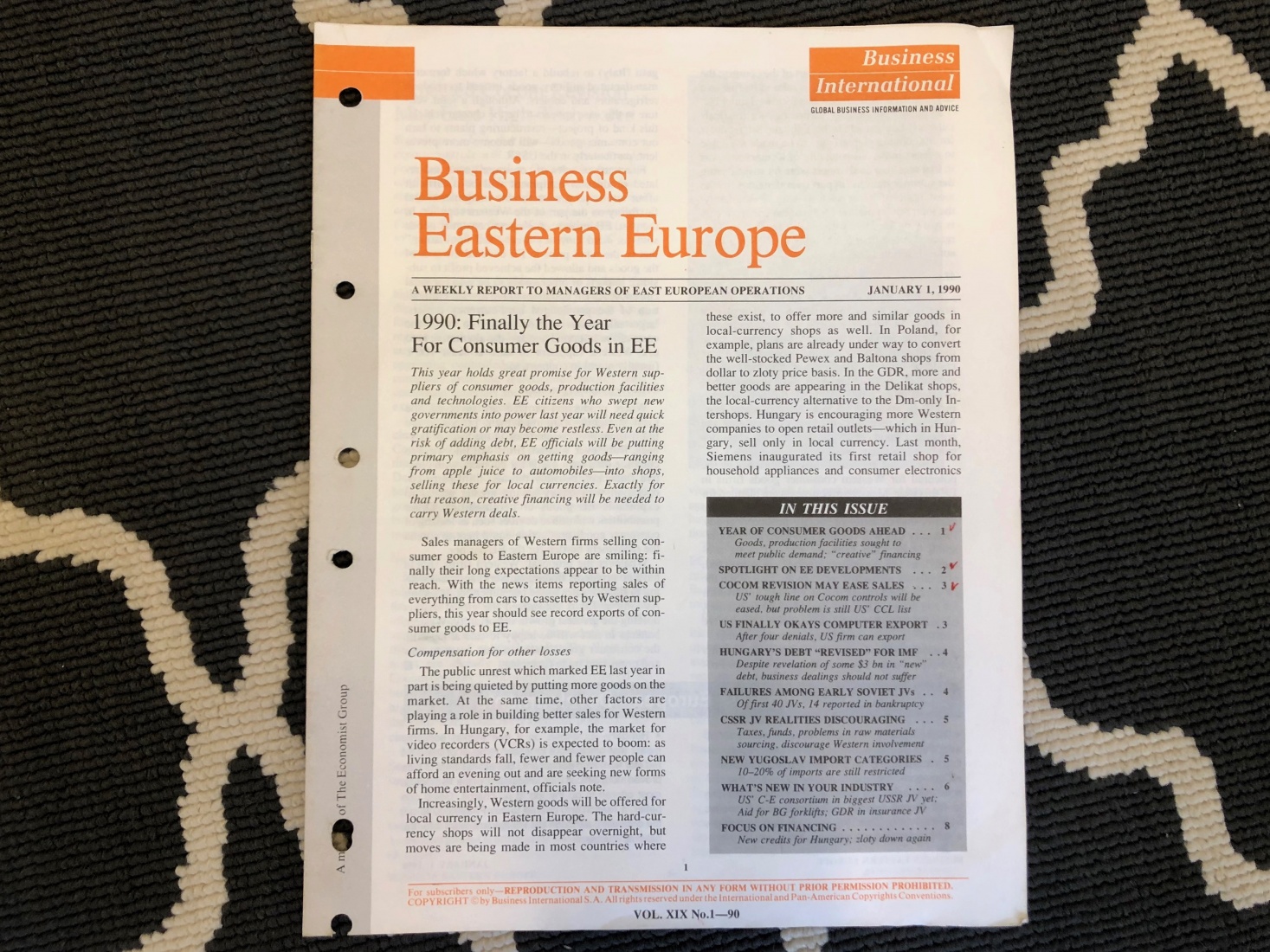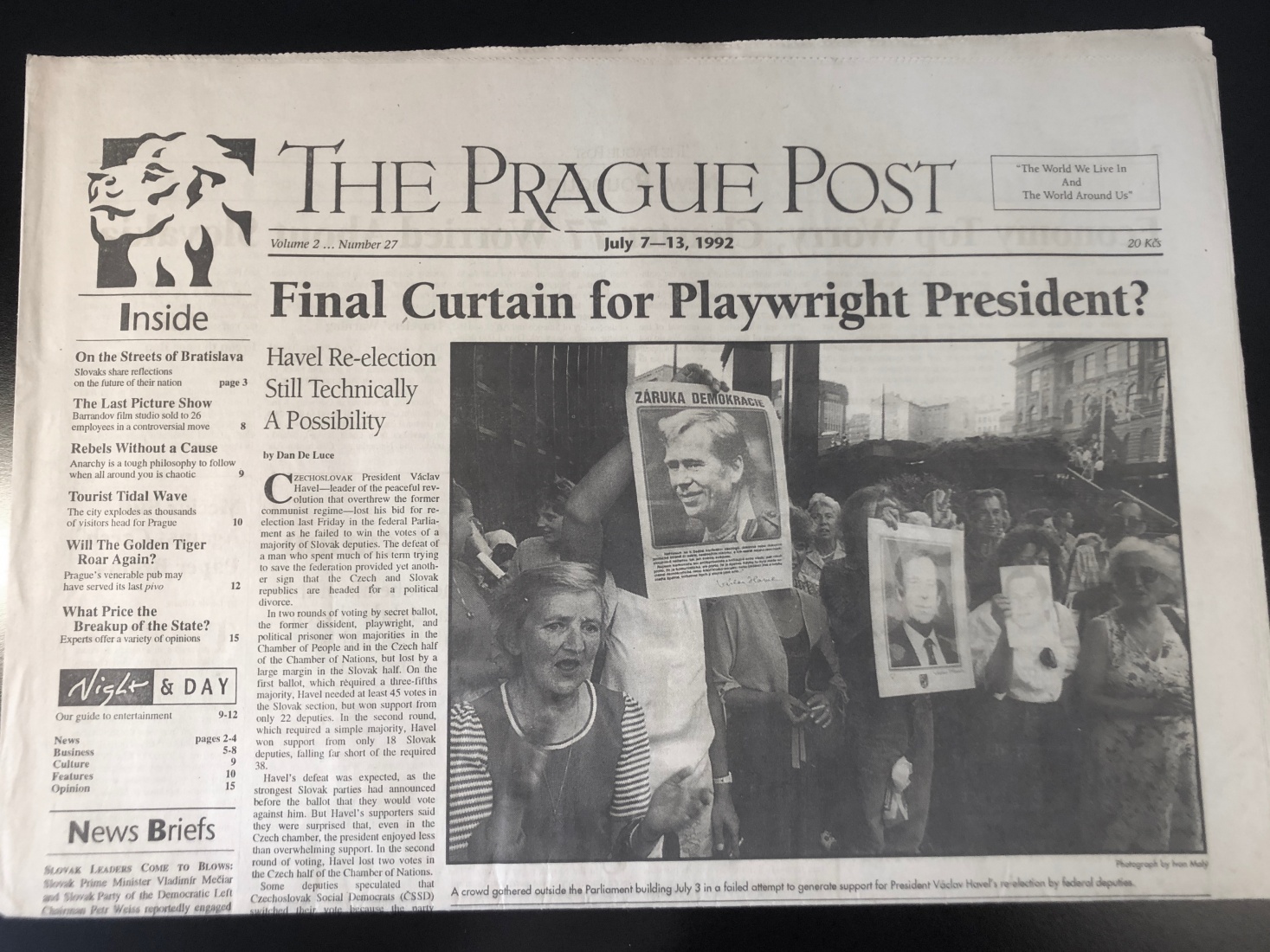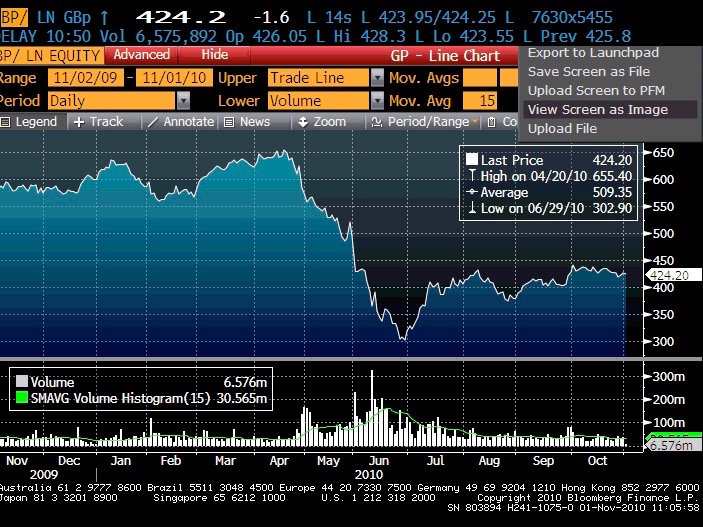Growing up, I wasn’t one of those kids who knew what they wanted to do when they got older. I had done well in school and figured I’d follow my nose until something turned up. It wasn’t until my mid-20s and my first job out of grad school with a publishing company called Business International that I determined I’d be a journalist. I enjoyed writing and it felt like a good fit.
That first job ended up working out better than I could have possibly hoped. This was the company that first brought me to Central Europe, and for five years, in the late '80s and early '90s, I worked out of their Vienna office writing articles about the former Eastern bloc.
The collapse of communism in 1989 dramatically opened up writing opportunities in Central and Eastern Europe, and I began to think about moving somewhere in the region where I could report first-hand on the political transformation underway. In 1991, I resigned my job in Vienna and relocated to Prague.
Fate was on my side in that move too. Shortly after arriving in Prague, I met two Americans, Lisa Frankenberg and Kent Hawryluk, who were setting up “The Prague Post,” an English-language weekly that had great promise. They were looking for a business editor to cover the economic side of the post-communist transformation. Based on my prior writing experience, I got the job.
Those first couple of years in Prague turned out to be highly satisfying from a professional standpoint. At the Post, we covered all kinds of once-in-a-lifetime stories, from the controversial sell-off of state assets all the way to the break-up of Czechoslovakia in 1993.
Prague was regularly in the international headlines in those early years, but then, sometime in 1994 or so, the post-Communist transformation story ran out of juice. The fall of communism wasn’t going to hold the world’s attention forever and the newly minted Czech Republic was now safely on its way toward NATO and EU membership. Besides, a nasty war had broken out in the former Yugoslavia and it was grabbing all the headlines. The TV cameras and news crews decamped to the Balkans in droves.
That year, 1994, I decided to return to the United States. I was determined to keep my journalism career moving forward and it had become apparent that if I wanted to grow in the job, I’d have to find a bigger pond. I'd have to go home.
I’ll spare the details of the relocation; it’s enough to say the transition wasn’t entirely smooth. While it felt right to be home again, I also missed my old life in Prague. And I hadn’t anticipated how hard it would be to find a job. When I had first left the U.S. to move to Vienna eight years earlier, no one had told me my overseas job experience wouldn't necessarily translate back in my home country -- but it was true. American news organizations had no point of reference for evaluating my resume in Europe.
Finally, after months of searching (and receiving dozens of one-line rejection letters from places like the Akron Beacon-Journal and the Cleveland Plain Dealer), I landed a job as an editor with an emerging company in financial journalism called Bloomberg Business News. I was thrilled with the offer and felt my career was back on track.
The transition to an American newsroom, though, especially one as high-stress and humorless as Bloomberg, was something I was totally unprepared for. I was still suffering from reverse culture shock, and Bloomberg had more than its share of own quirks on top of that.
My first assignment for Bloomberg was covering U.S. company news from their newsroom in Princeton, New Jersey. In addition to having to learn how to digest corporate earnings statements in just seconds, I was also expected to master the company’s notoriously opaque Bloomberg terminal, a standalone desktop device used by stock, bond and currency dealers around the world. It was anything but intuitive.
I have lots of memories from those early Bloomberg days, but one of the clearest came on my first or second day on the job, when I walked over to my supervisor, a tough woman who ran hot and cold depending on the day, to ask where I could get a pencil. Instead of “go to the supply room” or something like that, she gave me a hard stare and told me never to address her in person again. If I wanted her attention, I should send her an electronic message over the Bloomberg terminal.
And that’s mostly how those early days went: a mundane routine of logging in at 8am, staring into the Bloomberg terminal until time to go home (never before 6pm), avoiding unnecessary contact with co-workers, and waking up the next day to do it all over again. That’s not to say everything was bad -- on the contrary, I met many talented people at Bloomberg and learned a ton about financial journalism (and writing generally) -- it’s just not what I expected.
And then there was the cult of “Mike,” the aura that surrounded the company’s legendary founder, Michael Bloomberg. This was years before he would serve as New York mayor or make a run for the presidency, but even then his name was only ever evoked in hushed, reverential tones. Right from the start, I learned never to say anything about Mike that might be construed as critical. It wasn't done.
Of course, I had no inkling at the time I’d be sitting across the desk from him one day having a tense conversation about a Mexican jumping bean and my future career in journalism, but that moment was coming.
I don’t want to leave the impression that I was some kind of malcontent or didn’t give it my best shot. I was determined to make my transition to the U.S. a success, and I took my job at Bloomberg seriously.
After a few months in the New Jersey newsroom, that effort appeared to pay off when I was transferred to Bloomberg’s main newsroom in Manhattan to edit for the company’s bread-and-butter beats of Wall Street stock and bond trading. I was happy to be out of New Jersey and the promotion helped to keep intact that comforting myth of a logical career arc. Everything again made sense.
During my time at Bloomberg, I actually had two sit-down, face-to-face meetings with Mike Bloomberg. The second, and last, was that jumping bean thing, but the first was much more pleasant and came shortly after I'd made the move up to New York. The story of that first meeting shows just how much I wanted my Bloomberg job to succeed.
As I said, I was ambitious and determined to make a good impression. I knew that Michael Bloomberg was looking to expand his aspiring radio and television businesses, which were fairly rudimentary at the time. This was also during the mid-1990s, when the Republican-led Congress and House Speaker Newt Gingrich were regularly attacking the U.S. Public Broadcasting Corporation and publicly funded National Public Radio (NPR). Gingrich regularly called on the government to "get out of the culture business,” and in his words I saw the outlines of a deal.
For a few weeks back then, after work, I’d head back to my apartment and spend my evenings drawing up the basic terms of a proposal for Bloomberg to buy a stake in National Public Radio (or at least demonstrate a public interest in the radio's survival). I reasoned that NPR’s well-educated and upwardly mobile listeners would suit Bloomberg’s target demographic. Bloomberg had the financial means to support NPR’s cultural offerings and the company could use the network’s national platform to introduce its own news and business programming to a wider audience. If Gingrich really was serious about selling, Bloomberg could step in as America’s white knight.
Once I felt confident that my talking points were ready for prime time, I cued up Mike’s name on the Bloomberg messaging terminal and sent him an electronic message. The exchange went something like this:
“Hi Mike, I’m an editor in the newsroom. Could I stop by your office at some point? I have some ideas for a business proposal that I’d like to share with you.”
I sent it off, my heart skipped a beat, and then his name started flashing on my terminal (that meant he’d gotten the message and was responding):
“Sure, come by this afternoon.”
It was on.
I can’t recall the actual meeting in great detail, other than the fact it was relatively short. I remember nervously introducing myself, sitting across a surprisingly modest desk, presenting the rationale for my presentation, and then hitting him with what I thought was the deal-breaker: “Why not call Gingrich’s bluff and make an offer for NPR?”
He pondered it for a couple of seconds, let the silence hang, and then shook his head. “[Gingrich] is just bluffing," he said. "They’d never sell.” And that was that. It had been a fanciful idea anyway. He thanked me for the suggestion, and I went back to my terminal. Bloomberg, to the best of my knowledge, would never go on to approach NPR (and maybe in retrospect that’s not such a bad thing).
For the next year or so, my career at Bloomberg News proceeded on an even keel. I hadn't noticed any big bump from my meeting with the boss, but I was rising among the ranks of the editors. As the day-to-day began to set in, though, I found myself missing my life in Prague more and more, and started thinking about ways to return to Europe, perhaps even through Bloomberg, which had a string of overseas bureaus in Europe.
The main problem with that idea, though, was that any transfer would have to go through the company’s worldwide editor, Matt Winkler. Matt was a legend in financial news circles, both for his excruciating attention to detail and unpredictable temper. His twinkling eyes and ever-present bow tie gave off the amiable impression of a nattily dressed Arte Johnson, but in conversation he had the countenance of an owl and the temper of a pit bull.
I happened to catch Matt one day in the corridor and mentioned off-hand that I’d be interested in returning to Europe at some point if Bloomberg ever had an opening. Right away, I realized I'd made a colossal blunder (somehow I’d forgotten that first lesson at the company about approaching people unannounced). He was obviously peeved by my interruption. I’ll never forget the response (delivered in not quite a yell, but louder than a normal conversation): “It’s not what you want. It’s what we want for you.”
That interaction was a letdown, and from that moment I drifted into what might be termed the "dissident" camp in the New York newsroom: editors and reporters who worked hard, but without buying into the Bloomberg hype and rah-rah.
I suppose that also explains my mindset heading into the moment that would change my career trajectory, not just at Bloomberg, but for everything that came after.
It was an ordinary day, around lunchtime, and one of my routine tasks was to send out over the Bloomberg terminal an hourly headline for the U.S. dollar and Mexican peso. The announcement was meant for currency traders and read something like this: “The U.S. dollar is trading at xx to the Mexican peso” (with the xx being the actual rate).
I dutifully cued up the headline on the screen and as a joke changed the words “Mexican peso” to “Mexican jumping bean.” I had no intention of sending it out over the system (and certainly meant no ill will toward Mexico, the peso, or Bloomberg); it was simply a silly reference to a kid’s novelty toy. I nudged the editor at the work station next to me to show him my little joke and then went to clear the screen. Unfortunately, as I went to hit “delete," my finger accidentally bumped “send.” I sat in frozen terror as the jumping bean headline crossed the terminal to viewers around the world.
What happened after that is something of a blur. The newsroom erupted, telephones rang and everyone wanted to know the same thing: “Who sent out that jumping bean headline??”
I knew from the start I was busted. I quickly fessed up to my supervisor, who turned me over to Matt, who turned me over to Mike, and once again I found myself sitting across from the boss over his surprisingly modest desk. The polite civility of our first encounter was gone, though to his credit he was more stern than angry: “You know," he said, "mistakes like that can ruin my company.” I apologized, said it would never happen again, and returned to my workstation. Talk about a bad day at the office.
In truth, it had been a minor error. A juvenile prank, for sure, but no fortunes had been won or lost and no markets moved. Currency traders around the globe probably allowed themselves a half a second or so to smirk before returning to their jobs of buying and selling money.
At the same time, nothing after that was ever the same.
I actually managed to keep my job, but it was made clear to me that it would be a long time before I ever found myself back on the fast track. Six months later, I resigned and within a year I was back in Prague.
That carefully crafted career arc had cracked (and for the dumbest of reasons), and yet maybe that wasn’t such a bad thing. Within a few months back in Europe, I'd managed to land an editing job at the Prague-based Radio Free Europe/Radio Liberty that was much closer to my expertise than what I was doing at Bloomberg. Life went on. My path, though, had been anything but logical.








What a great article, Mark, thanks! That accidental “bump,” sending the exchange rate of the Mexican jumping bean around the world, was probably one of the luckiest things that ever happened to you. Imagine if you’d actually acclimated to Bloomberg, how miserable you’d have been…
Hi Jim, a cautionary tale, but you’re right. Looking back, sometimes fate needs a jumping bean or two to tell you where you really ought to be. 🙂
Great blog, another great post! You really captured some of that special brand of Bloomberg angst. I spent some time in that (Fifth Ave?) office, then worked abroad for them briefly. The cult of Mike was definitely not as strong in the far-flung bureaus. In fact, there was a sense of cameraderie. Everyone hated working there, and we bonded to some extent as a result, like in an American public high school. My days as a Bloomie are long since behind me as well.
Your misstep is also typical of newswire reporters: intelligent, over-educated, underachievers performing rote, yet highly stressful tasks (flashing the NYSE open, calling Mr Rent-a-Quote at Nomura for the third time that week, etc). Everyone slowly going crazy.
I once mistakenly sent a joke headline as well, but it only went it as far as the editor. I made a quick phone call, explained that a botched cut and paste job had garbled the text, and nothing ever came of it.
Life is a game of inches of course.
Thanks for reading and leaving a comment, and of course for your nice comments about my blog! Very much appreciated. I think you really have to work there to understand the reality. I would love to hear the story of your joke headline!
Yes, I am surprised no one has ever written the great Bloomberg novel! Captured its essence. Up to you and me I suppose….
My little episode happened a few years after I left the Bloom, when my career was in one of its occasional low points. I was still in financial news, but now at an obscure wire. I was actually training a new employee, showing him how to flash headlines, and since it was just an example I made some crazy joke in the headline and somehow sent it off to London. There was that moment of sheer panic, and then everything was OK.
Wires seem to bring out that sort of behavior, which I believe stems from the combination of the stress of having to crank out so many stories and headlines per day and the boredom of writing about issues of limited interest outside the financial world.
I am quite distant from that world now, and that sleep-deprived hack, caffeined up all day, drinking fairly heavily or smoking pot in the evenings, is gone.
Ah, the memories! If you haven’t already, check out The Imperfectionists by Tom Rachman. It describes the now deceased IHT, so it is a rather more rarified world than our humble wires, but it captures a bit of that life.
Great article Mark. Brings a smile and chuckle and remembrance of all of the positive accidents along the way in my career.
Hi Jerry, Thank you and happy you liked the story!
That was hilarious. Thanks!
What a great story, I laughed out loud! If you have a sense of humour and proportion and you have to hide it in a humourless, dull, angry, vacuum, sooner or later you are gonna get caught!
Ha. Just saw this today. And to think that if you’d stuck it out, the Russian Invades Ukraine could have been your parting gag.
Well good for you for leaving